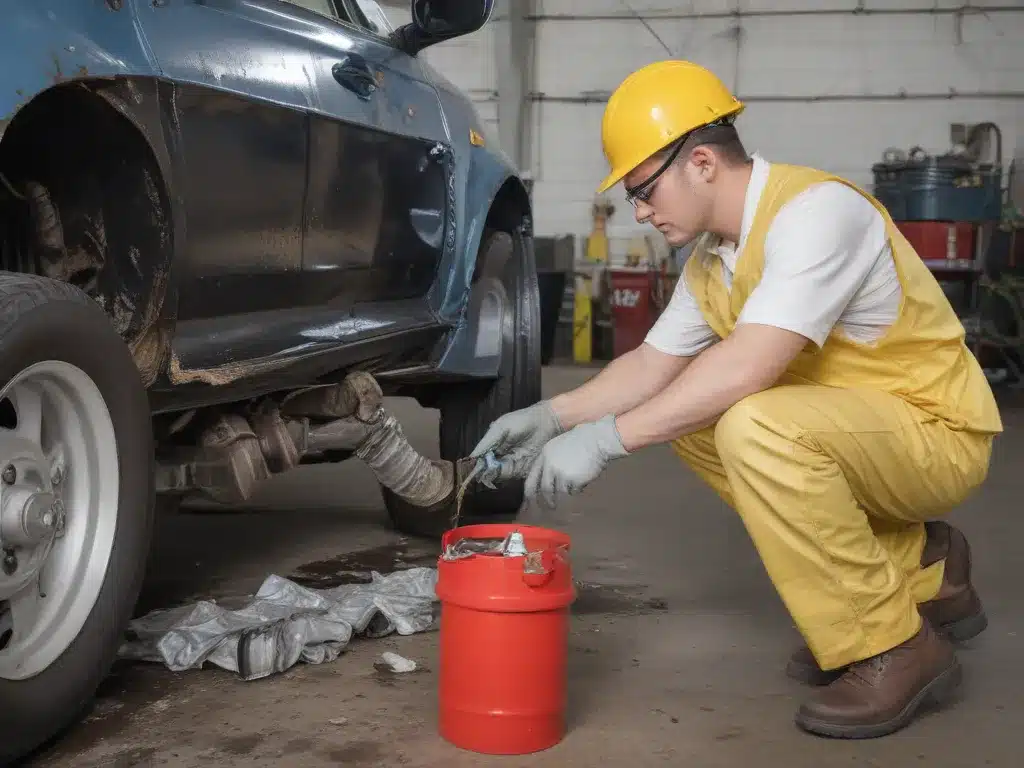
The Dirty Truth About Car Maintenance
As a car owner, I know the importance of keeping my vehicle in top shape. But let’s be honest – car repairs and maintenance can be a dirty business. The fluids, chemicals, and waste products involved often contain hazardous materials that can be harmful to the environment if not disposed of properly.
I mean, think about it – we’re talking about things like motor oil, transmission fluid, brake fluid, antifreeze, and a whole host of other nasty substances. And where do these end up when we take our cars in for service? Well, that’s where the problem lies.
The Environmental Impact of Improper Disposal
Imagine if all that waste just got dumped down the drain or tossed in the trash. The consequences would be disastrous! These hazardous materials can contaminate our soil, pollute our waterways, and even make their way into the air we breathe. It’s a sobering thought, but one that we need to take seriously.
You see, improper disposal of automotive fluids and chemicals is a major contributor to environmental pollution. When these substances leak into the ground or get washed down storm drains, they can wreak havoc on the delicate ecosystems around us. Fish, wildlife, and even our own drinking water supplies can be put at risk.
And it’s not just the big stuff, either. Even small spills or leaks from our own vehicles can add up to a significant environmental impact over time. That’s why it’s so important to be mindful of how we handle and dispose of these materials.
Responsible Automotive Maintenance Practices
So, what can we do to minimize the hazardous waste from car repairs and maintenance? Well, the good news is that there are plenty of steps we can take to be more eco-friendly.
First and foremost, it’s crucial to find a reputable auto repair shop that takes sustainability and environmental stewardship seriously. Look for shops that have implemented best practices for waste management, such as:
- Proper storage and labeling of hazardous materials
- Recycling or reclaiming used fluids and filters
- Disposing of waste through certified hazardous waste handlers
But it’s not just the shops that need to be responsible – we as consumers have a role to play as well. Here are some things we can do to minimize our own automotive waste:
- Carefully inspect our vehicles for any leaks or fluid buildup, and address them promptly
- Properly dispose of used motor oil, filters, and other automotive fluids at designated recycling centers
- Consider using eco-friendly, biodegradable products whenever possible
- Learn how to perform basic maintenance tasks like oil changes and fluid top-ups ourselves, to reduce reliance on repair shops
By taking a proactive and eco-conscious approach to car care, we can all do our part to protect the environment and reduce the overall impact of the automotive industry.
The Benefits of Going Green
Now, I know what you might be thinking – “But won’t all this sustainable stuff cost me more time and money?” And that’s a fair concern. After all, being environmentally responsible doesn’t always come cheap or convenient.
However, I would argue that the long-term benefits of minimizing hazardous waste from car repairs far outweigh the short-term inconveniences. Not only are we contributing to a healthier planet, but we’re also often saving money in the long run.
For example, properly maintaining our vehicles and using high-quality, eco-friendly products can actually extend the life of our cars, reducing the need for costly repairs and replacements. And by recycling used fluids and filters, we’re keeping those hazardous materials out of landfills and water supplies, which saves us all money in the form of cleaner, safer communities.
Plus, let’s not forget the sense of pride and satisfaction that comes with knowing we’re doing our part to protect the environment. It’s a win-win situation all around!
Overcoming the Challenges
Of course, I’ll admit that transitioning to more sustainable automotive practices isn’t always easy. There can be some real logistical and financial hurdles to overcome.
For instance, finding a reliable and trustworthy auto repair shop that prioritizes eco-friendly practices can be a challenge. And properly disposing of used fluids and other waste products can sometimes be a hassle, especially if there aren’t convenient recycling options available in our local area.
But you know what? I’ve found that with a little bit of research, persistence, and creativity, these challenges can be overcome. It might take some extra time and effort, but the payoff in terms of environmental impact is well worth it.
And who knows – by being vocal about our preference for sustainable automotive services, we might just be able to drive (no pun intended) positive change in the industry as a whole. After all, consumer demand is a powerful force, and it’s up to us to steer the conversation in a greener direction.
Conclusion: A Cleaner, Greener Future
At the end of the day, minimizing hazardous waste from car repairs and maintenance is not only good for the planet, but it’s also good for our own health and well-being. By taking a more eco-conscious approach to automotive care, we’re not only protecting the environment, but also safeguarding our own communities and future generations.
So, let’s roll up our sleeves, get a little dirty, and do our part to keep our cars – and our world – in tip-top shape. After all, we’re all in this together, and every little bit of effort counts.
Who’s with me? Let’s drive toward a cleaner, greener future, one oil change and fluid top-up at a time!


